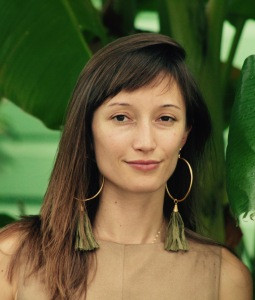School of the Earth, Ocean and Environment
Faculty and Staff Directory
Monica Barra
| Title: | Assistant Professor |
| Department: | School of the Earth, Ocean & Environment and Department of Anthropology McCausland College of Arts and Sciences |
| Email: | mbarra@seoe.sc.edu |
| Phone: | 803 576-8340 |
| Office: | Gambrell 423 |
| Resources: |

Bio
Monica Patrice Barra is a cultural anthropologist with an interdisciplinary background in cultural geography and American Studies. She joined the University of South Carolina in 2019 as an Assistant Professor of Race and Environment with a joint appointment in the Department of Anthropology and the School of the Earth, Ocean & Environment. She is also a faculty affiliate in the Department of African American Studies and the Department of Geography. She earned her Ph.D. in Cultural Anthropology from the Graduate Center at the City University of New York.
Research areas
Environmental Racism and Justice, Critical Race Studies, Anthropology and Ethnography of North America, Black and Indigenous Ecologies, Political Ecology, Science Studies, Public Arts and Humanities
Research
Dr. Barra’s research and collaborative projects are driven by questions of racial
and environmental justice and social repair in the American South. Her long-term ethnographic
work with Black coastal communities and coastal restoration engineers and field scientists
in southeast Louisiana examines how unprecedented wetland loss, climate change, and
environmental restoration projects intersect with racial and geographic inequalities.
It also explores how frontline communities view environmental restoration as a project
for social transformation. This research forms the basis of her first book, Good Sediment:
Restorative
Science and the Racial Politics of Coastal Restoration (under review). Her interests
in the intersection of housing, coastal environmental change, and Black geographies
inform her current research, which examines the everyday aspects of living on and
protecting family land (heirs property) in the coastal American South.
Dr. Barra’s interdisciplinary interests have led to collaborations with various groups, including: engineers, geologists, fishermen, farmers, coastal communities, visual and performing artists, and arts and cultural institutions. Notable examples include her roles as an environmental anthropologist with the Water Institute of the Gulf (2015-2018), an ethnographer with the Harvey B. Gantt Center for African-American Arts + Culture (2022-2024), and a collaborator on a multi-institutional study on climate change and adaptive resilience in the Yazoo - Mississippi Delta (2023-2027).
Teaching
- ANTH 342 | ENVR 342: Environmental Anthropology
- AFAM 348 | ENVR 348: Environmental Racism and Justice
- ANTH 540 | ENVR 540: Decolonizing the Environment
- ANTH 730: Contemporary Anthropological Theory Through Ethnography
Representative Publications
Barra, M.P. (2024). Restoration otherwise: Towards alternative coastal ecologies. Environment
and Planning D: Society and Space, 42(1): 147-165. https://doi.org/10.1177/02637758221146179
Barra, M. P. (2024). Legacy and evolution: The Harvey B. Gantt Center for African‐American Arts
+ Culture. Museum Anthropology. DOI: 10.1111/muan.12300.
Barra, M.P. (2024). Restoration and Reparations: Imagining Coastal Repair. Theorizing the Contemporary, Fieldsights, January 25.
Barra, M.P. (2023) Plotting a geography of paradise at the end of the world: Black ecologies,
productive nostalgia, and the possibilities of life on sinking ground. Transforming
Anthropology, 31(1): 15-28. https://doi.org/10.1111/traa.12243
Barra, M.P. (2021). Good Sediment: Race and Restoration in Coastal Louisiana. Annals of the American Association of Geographers, 111(1): 266–282. https://doi.org/10.1080/24694452.2020.1766411
Barra, M.P.; Scott Hemmerling; Melissa Baustian. (2020). A model controversy: Using environmental competency groups to inform coastal restoration planning in Louisiana. Professional Geographer, 72(4): 511-520. https://doi.org/10.1080/00330124.2020.1777574
Hemmerling, S.; Monica Patrice Barra; Rebecca Costa. (2020) Planning for a smaller coast: Restoration, protection, and social justice in coastal Louisiana." In, Louisiana’s Response to Extreme Weather: A Test Case for Coastal Resilience, Shirley Laska, Ed. Springer Publishing Company. (pg.113-144). https://doi.org/10.1007/978-3-030-27205-0_5
Barra, M.P. (2018). Memory and Land Loss in South Louisiana. In, Gender: Space. Aimee Meredith Cox, ed. Macmillan Interdisciplinary Handbooks: Gender series. Farmington Hills, MI: Macmillan Reference USA. (pg. 97-111).
Recent Accomplishments
McCausland Faculty Fellowship (2024). College of Arts and Sciences, University of South Carolina
Breakthrough Star Award (2023). Office of the Vice President for Research, University of South Carolina
Arts Research with Communities of Color Fellowship (2022-2024). Social Science Research Council and Wallace Foundation for the Arts. Harvey B. Gantt
Center for African-American Arts and Culture.
Hunt Postdoctoral Writing Fellowship (2021). Wenner-Gren Foundation for Anthropological Research.
Early Career Fellowship (2020-2022). National Academies of Sciences Gulf Research Program.
Innovators Fellowship (2019-2021). National Center for Atmospheric Research and National Science Foundation.
Rebirth Grant (2017). Louisiana Endowment for the Humanities.
Monroe Fellowship (2016). New Orleans Center for the Gulf South, Tulane University.